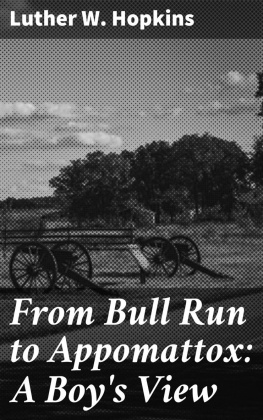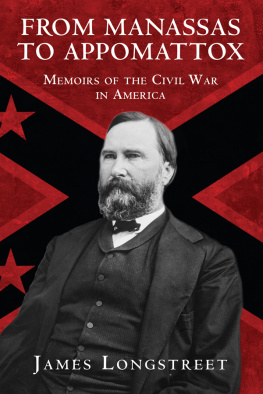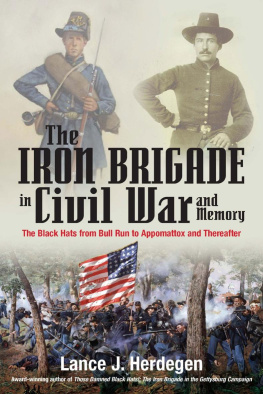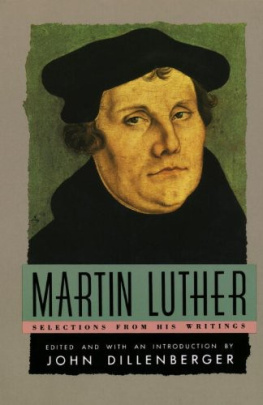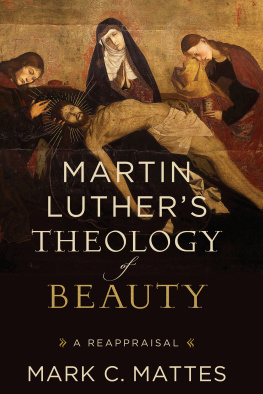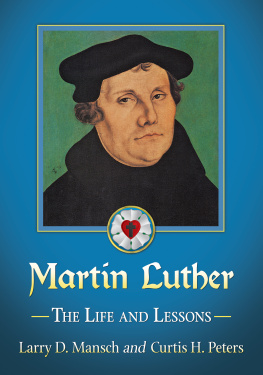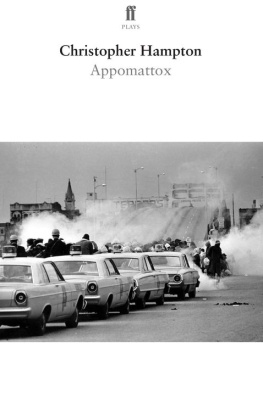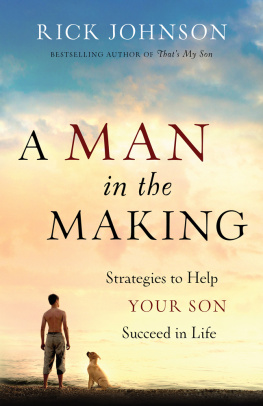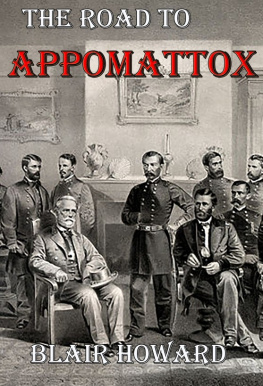PREFACE
Table of Contents
"Life is the mirror of the king and slave,
'Tis just what you are and do.
Then give to the world the best you have,
And the best will come back to you."
I never thought that I should be guilty of writing a book. I did not, however, do this with malice aforethought. My son is responsible for whatever sin I may have committed in presenting this to the public. He and I have been good friends ever since we became acquainted, and he has always insisted upon my telling him all that I know. When he was about three years old he discovered that I had been a soldier in Lee's army from 1861 to 1865, and, although he is of Quaker descent and a loyal member of the Society of Friends, and I am half Quaker, yet he loved war stories and I loved to tell them. This accounts for the production of the book. After I had told him these stories over and over, again and again, when he was grown he insisted upon my starting at the beginning and giving him the whole of my experience in the Confederate army. Then he wanted it published. I yielded to his request, and here is the book. This is not, however, an exact copy of the typewritten manuscript which he has. The original manuscript is more personal. I thought the change would make it more acceptable to the general reader.
We all believe in peace; universal peace, but when war does come, and such a costly war as the one from which this story is taken, we ought to get all the good out of it we can. The long marches along dusty roads, under hot suns, the long marches through sleet and snows, the long dreary nights without shelter, the march of the picket to and fro on his beat, the constant drilling and training, the struggle on the battlefields, all these are part of the material that the world has always used in constructing a nation. While there are some things about war that we should forget, there are many things that ought never to be forgotten, but should be handed down from sire to son all through the ages that are to come.
Historians have told us much about our Civil War, but they have left out the part that appeals most to the boy, and it is this part that I have tried to bring before the public. Men may read the book if they will, but it is written more particularly for the youth. The boy of today and the boy that is yet to be ought to know of the bloody sweat through which this nation passed in reaching its present position among the great nations of the earth, and the part the boy played in it. It is said that one boy is a boy; two boys a half boy and three boys no boy at all. That may be true of the boy running loose, unbridled like a colt, but gather up these boys and train them, harness and hitch them and they will move the world or break a trace. It is the boy who decides the fate of nations. I don't know the average age of our soldiers in times of peace, but when wars come and there is a call for soldiers, it is mainly the boy in his teens who responds; yet, strange to say, the historian has never thought it worth while to put much emphasis upon what the boy does in the upbuilding of a nation.
Another thing that has been neglected by the historian is the brave and noble part the horse took in our war. The grays, the bays, the sorrels, the roans, the chestnuts, have not been forgotten in this story. Indeed, as I have already said, I have tried to bring to light that part of the story of our Civil War that has not been told.
Now, young men and boys, girls too, old men, if there are any, read this book, all of you, regardless of geographical lines, for I have tried to be fair to those who wore the blue. As the years go by, I have learned to respect and love those who fought for the Union. I visited Boston and its environments two summers ago for the first time. During the visit, I never met a person whom I had ever seen before, yet all the time that I was away I felt at home. I said to myself, are these the people we of the South used to hate? Are these the people that we once mobbed as they marched through our streets? Yes, they are the same people or their descendants, but then we did not know them and they did not know us. I came back feeling proud of my country, and I only wish I could give here a detailed account of that visit. If, early in the spring of 1861, the North and South had swapped visits, each party would have gone home singing, "there ain't goin' to be no war," but we had a war; a great war, a costly war; let us forget what ought to be forgotten and remember what ought to be remembered. I want to pay this tribute to the Northern soldiers. I have discovered this: When two armies of equal numbers met face to face in the open, it was nearly always a toss up as to who would win. Numbers don't always count in battle. General Hooker, with his army of 130,000, retreating before Lee's 60,000, doesn't mean that one rebel could whip two yankees. It only meant that "Fighting Joe" had more than he could manage. His numbers were an encumbrance. There were other differences which, for the sake of brevity, I will not mention, but will add this one word: One bluecoat was all I cared to face, and I believe every other Johnny Reb will say the same.
May we never have another war, but boys, remember this: "Peace hath her victories, no less renowned than war," and the boy that wishes to count in this world must train. But there are other training schools quite as helpful as the camp and the battlefield.
L.W. HOPKINS.
Baltimore, November, 1908.
From Harper's Ferry to Bull Run.
Loudoun County on the PotomacJohn Brown's RaidWar Talk Among the SchoolboysThe Slave and His MasterElection of LincolnSecessionSchoolboys Preparing for the Coming ConflictFiring on Fort SumterUnion Army Crossing the Potomac.
From Bull Run to Seven Pines.
Confederates Concentrating at ManassasFirst BattleThe Wounded HorseRout of the Union ArmyThe Losses.
From Bull Run to Seven Pines. (Continued.)
Long RestEach Side Recruiting Their ArmiesMcClellan in CommandHis March on Richmond by the Way of the James RiverJackson's Brilliant Valley CampaignThe Battles Around RichmondSeven PinesMechanicsvilleBeaver DamGaines' MillFair OaksThe Wounding of Gen. Jos. E. JohnstonMcClellan's DefeatThe Spoils of the Battle.
From Seven Pines to Antietam.
The Battle of Cedar RunJackson's Flank MovementMcClellan Moves His Army Back to WashingtonSecond Battle of ManassasThe Defeat of PopeHis Retreat to the Defenses of WashingtonThe Captured Stores and Losses on Both SidesLee Crosses the Potomac Into MarylandThe Stragglers of Lee's ArmyA Dinner PartyThe Capture of Harper's FerryBattle of AntietamResult of the BattleLee Recrosses the PotomacLee in a Trap.
From Antietam to Chancellorsville.
McClellan Relieved of His CommandBurnside Commands the Union ArmyThe Two Armies at FredericksburgThe Blue Ridge MountainThe Author a PrisonerBattle of FredericksburgBurnside's DefeatLosses on Both SidesThe Armies in Winter QuartersHow They Spent the WinterCompany Q's EscapadeRaid Into West VirginiaBurnside RelievedHooker in CommandHooker Crossing the RappahannockJackson's Successful Flank MovementHis Mortal WoundHooker's DefeatHe Recrosses the RiverLosses on Both SidesStonewall Jackson's DeathThe South in TearsOde to Stonewall Jackson by a Union Officer.


